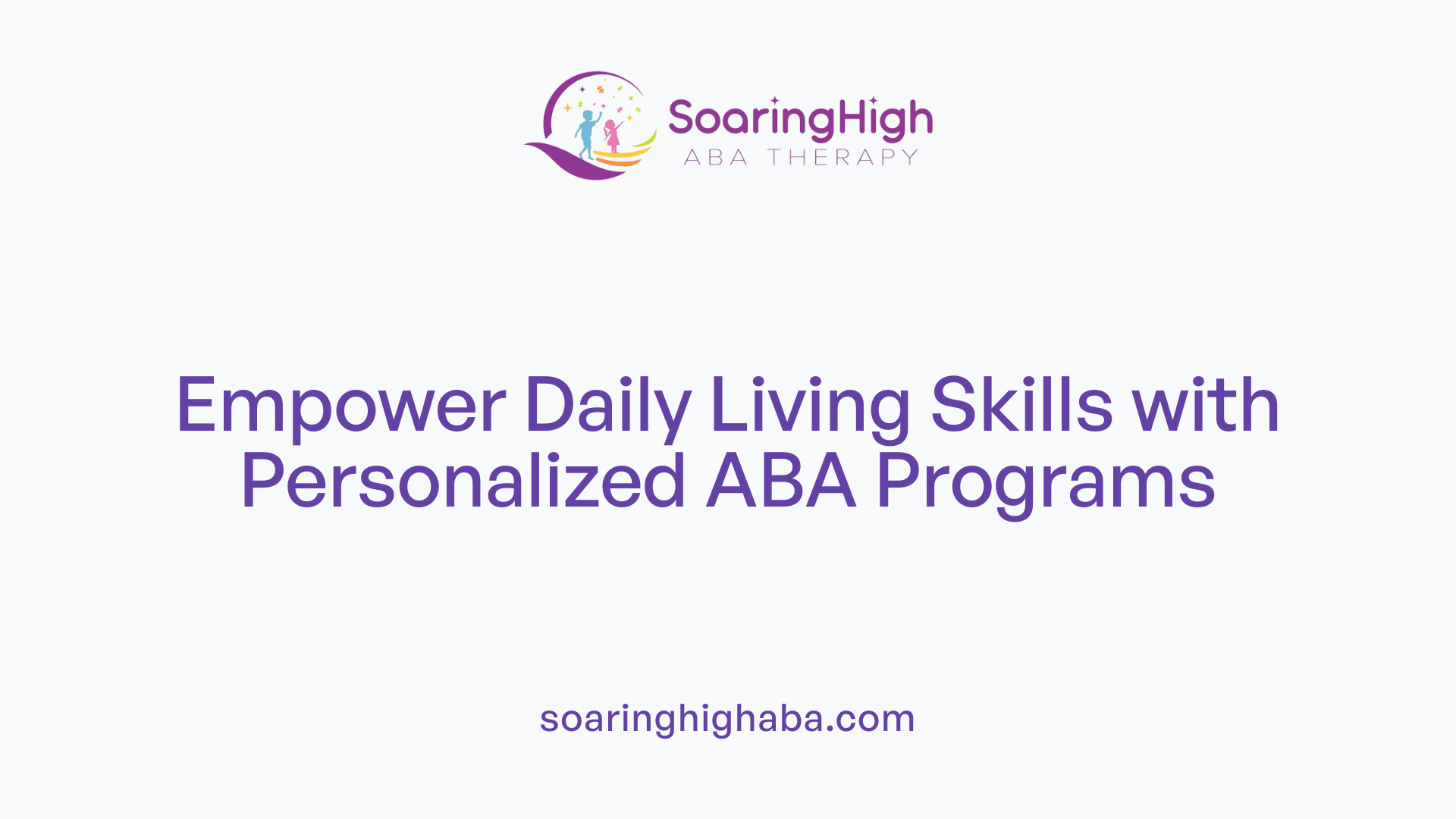Unlocking Daily Living Skills with Individualized ABA Therapy
Applied Behavioral Analysis (ABA) therapy has established itself as a cornerstone in supporting individuals with autism. Tailored ABA programs are especially effective, focusing on developing essential daily living skills that foster independence and improve quality of life. This article explores how personalized ABA interventions are designed, implemented, and evaluated to help individuals achieve greater autonomy across various settings and stages of life.
Personalization and Goal-Driven Interventions in ABA Therapy

How do tailored ABA programs support the development of daily living skills?
Customized ABA programs are designed to meet each individual’s unique needs, focusing on important daily living skills such as dressing, grooming, cooking, and managing money. These programs set clear, personalized goals that guide the intervention process, ensuring that learning is relevant and effective.
Therapists use structured teaching techniques like task analysis, which breaks down complex skills into simple, manageable steps. For instance, learning to prepare a meal might be divided into tasks like gathering ingredients, using utensils safely, and cleaning up afterward. Visual supports such as pictures, checklists, or schedules are provided to help individuals understand what needs to be done and follow routines confidently.
Modeling is also employed, where therapists demonstrate tasks to encourage imitation and learning. Reinforcement strategies play a vital role as well—praising successes and providing tangible rewards motivate individuals to practice skills repeatedly. These strategies build confidence and foster independence.
Consistent practice across different settings, supported by visual cues and routines, helps individuals generalize skills outside the therapy environment. Regular assessments are conducted to monitor progress and adjust strategies, ensuring continuous growth toward autonomy. Ultimately, tailored ABA interventions empower individuals with the skills needed to live more independently and participate actively in their communities.
Benefits of Tailored ABA Programs for Daily Living Skills

What are the benefits of tailored ABA programs for improving daily living skills?
Customized ABA programs cater specifically to each individual’s unique needs, making the learning process more effective and efficient. These tailored interventions focus on developing vital routines such as dressing, personal grooming, toileting, and hygiene, helping individuals gain greater independence and reduce dependence on caregivers.
By systematically breaking down complex tasks into smaller, manageable steps, ABA therapy simplifies skill acquisition, making it easier to learn and master essential daily activities. The use of positive reinforcement encourages consistent learning and builds confidence in acquiring new skills.
In addition to improving functional daily routines, personalized ABA programs also support improvements in communication, social skills, and emotional regulation. These enhancements foster better integration into social and community settings, improving overall quality of life.
Family involvement plays a crucial role in the success of these programs. Training family members enables them to reinforce skills at home, promoting generalization and consistency across different environments.
Overall, tailored ABA therapies help individuals achieve greater independence, participation in daily activities, and social engagement, resulting in meaningful improvements in their everyday lives.
| Focus Area | Description | Additional Details |
|---|---|---|
| Daily Routines | Dressing, grooming, toileting, hygiene | Using task analysis and visual supports |
| Communication & Social Skills | Verbal expression, making friends | Focus on functional interactions |
| Task Breakdown & Reinforcement | Simplifying tasks, positive reinforcement | Builds confidence and motivation |
| Family Engagement | Skill reinforcement at home | Ensures skill generalization |
This comprehensive approach ensures that therapy is not only targeted but also sustainable, leading to lasting benefits.
Techniques and Strategies Used in ABA for Daily Living Skills
What methods are used in tailored ABA programs to teach daily living skills?
In personalized ABA programs, a variety of proven techniques are employed to help individuals develop practical and essential daily skills. These methods focus on breaking down complex activities into simpler, more achievable steps, ensuring the learning process is manageable and effective.
One core method is task analysis, which decomposes larger tasks—such as personal hygiene or cooking—into smaller, sequential actions. This allows learners to master each step before moving on to the next, building confidence and competence along the way.
Prompting with fading techniques are also integral. Therapists initially provide support through physical or verbal prompts and gradually reduce assistance as independence increases, allowing the learner to perform skills on their own.
Reinforcement strategies are used to encourage skill acquisition and retention. Positive reinforcement—such as praise, tokens, or preferred activities—motivates individuals to repeat successful behaviors and solidify new routines.
Shaping is another valuable approach, where successive approximations of a desired behavior are reinforced. This gradual adjustment helps guide learners toward more complex skills.
Natural environment teaching (NET) plays a crucial role by integrating teaching into everyday settings. Practicing skills in real-life contexts enhances generalization, making skills more applicable outside therapy sessions.
When teaching multi-step tasks, chaining methods like forward, backward, or total chaining are employed. These techniques help learners master a series of actions necessary for comprehensive skills, such as preparing a meal or using public transportation.
Throughout this process, systematic data collection is essential. Regular tracking of progress enables therapists to assess effectiveness, identify areas needing adjustment, and tailor interventions to maximize success.
Overall, these evidence-based techniques work together within tailored ABA plans to promote independence and improve the quality of life for individuals with autism.
Enhancing Independence in Daily Routines with Personalized ABA Interventions
How does individualized ABA therapy enhance independence in daily routines?
Personalized ABA therapy plays a crucial role in helping adults with autism develop essential life skills needed for independence. By customizing intervention plans based on each person’s specific strengths and needs, therapists use a combination of methods like visual schedules, modeling, and positive reinforcement.
Visual supports, such as picture cues or step-by-step charts, help individuals understand and anticipate daily activities. This reduces anxiety and empowers them to follow routines like cooking, personal hygiene, and budgeting more confidently. Modeling demonstrates desired behaviors, while reinforcement encourages consistent skill acquisition.
Structured routines are designed to be predictable, which fosters a sense of security and promotes learning. These routines are often integrated with natural play and real-life tasks, allowing individuals to apply skills in meaningful contexts, such as shopping or managing household chores.
Family involvement is vital. Caregiver training ensures that skills learned during therapy are reinforced consistently at home and in the community. This ongoing support strengthens the generalization of skills, helping adults with autism lead more independent and fulfilling lives.
By tailoring interventions to suit each individual’s needs, personalized ABA creates engaging, real-world routines that build confidence and promote functional independence—transforming daily life into accessible, manageable activities.
Effectiveness of Tailored ABA Programs in Promoting Daily Living Skills
How effective are tailored ABA programs in helping individuals with autism improve their daily living skills?
Customized ABA (Applied Behavior Analysis) programs have proven to be highly successful in enhancing the daily living skills of individuals with autism. These programs are carefully tailored through comprehensive assessments, ensuring that interventions target specific needs and goals such as personal hygiene, dressing, meal preparation, and money management.
Research supports that personalized ABA therapies employ evidence-based techniques like positive reinforcement, task analysis, and visual supports to teach practical skills. This approach not only fosters skill acquisition but also encourages independence by breaking complex tasks into manageable steps, making learning more accessible.
Results from multiple studies show that individuals undergoing tailored ABA interventions demonstrate significant progress in functional skills. They become better equipped to handle routine activities and adapt to various environments, from home to community settings.
Moreover, these programs support the generalization of learned skills beyond therapy sessions. Skills practiced in controlled environments are transferred to real-world situations, helping individuals navigate daily challenges with greater confidence.
The long-term benefits of personalized ABA are substantial. As individuals grow, their skills continue to evolve, enabling sustained independence into adulthood. Overall, tailored ABA programs are not only validated by research but are also considered essential for improving quality of life and fostering ongoing development for people with autism.
Creating Supportive Environments for Skill Acquisition
The role of familiar settings such as home and community environments
In-home and community environments play a vital role in effective ABA therapy for individuals with autism. These familiar settings help children and adults feel more comfortable, reducing anxiety and encouraging natural responses. Tailoring interventions to these real-life surroundings allows skills to be practiced in contexts where they are actually used, such as cooking in the kitchen or navigating a grocery store.
Reducing anxiety and facilitating natural responses
By conducting therapy in environments the individual knows well, ABA can decrease feelings of stress and create a positive space for learning. Familiar surroundings support more genuine participation, making it easier to generalize skills beyond the therapy setting. This approach often leads to quicker acquisition of daily living and social skills.
Coordination with other professionals like speech therapists
Effective ABA programs often involve collaboration with other specialists, such as speech therapists, occupational therapists, and educators. Working together ensures that interventions are cohesive and reinforce each other. For example, speech therapy techniques can be integrated into ABA sessions held at home or in community settings, amplifying the child's progress across multiple areas.
| Setting Type | Benefits | Additional Details |
|---|---|---|
| Home | Comfort, personalized intervention, natural environment | Enables family involvement, easier skill generalization |
| Community | Real-world practice, social interaction opportunities | Supports navigation skills and independence |
| Collaboration | Coordinated care, comprehensive approach | Enhances consistency and effectiveness |
Creating these supportive, familiar environments, and fostering collaboration among professionals helps build a strong foundation for developing essential skills, ultimately improving independence and quality of life for individuals with autism.
Involving Families and Caregivers in ABA Therapy
Training parents and caregivers as part of therapy
In ABA therapy for both children and adults, involving family members plays a crucial role in achieving successful outcomes. Training parents and caregivers equips them with the necessary skills to reinforce learning and develop daily living skills at home and in community settings. This training can include instruction on managing routines like personal hygiene, cooking, or using public transportation, ensuring that skills are consistently practiced outside of therapy sessions.
Reinforcing skills at home and in community
Reinforcement is vital for skill retention and generalization. Caregivers are encouraged to provide positive feedback when the individual exhibits desired behaviors, such as asking for help or managing personal care. Practicing these skills in natural environments, like the grocery store or park, helps individuals apply what they learn in real-world situations, increasing their confidence and independence.
Ensuring consistency and promoting natural environment learning
Consistency across different settings enhances the effectiveness of ABA therapy. When families and caregivers implement strategies consistently, individuals can better generalize skills learned during therapy. Moreover, learning in familiar, natural environments makes therapy more relatable and less intimidating, promoting smoother skill acquisition. Active involvement of family members helps create a supportive atmosphere, reinforcing progress and addressing challenges promptly to foster long-term development.
Empowering Lives Through Personalized ABA Strategies
Tailored ABA programs stand out as a comprehensive, effective approach to developing crucial daily living skills for individuals with autism. By customizing interventions based on thorough assessments and current best practices, these programs empower individuals to achieve greater independence and participate more fully in daily life. Through evidence-based techniques, consistent reinforcement, and active family engagement, personalized ABA therapy not only fosters skill acquisition but also promotes confidence, social integration, and improved quality of life. As research continues to support its efficacy, tailored ABA remains a vital tool in enabling individuals with autism to thrive in their everyday routines and future endeavors.
References
- ABA Therapy for Adults: Benefits and What to Expect
- Top 7 Benefits Of ABA Therapy For Autistic Children
- Home-Based ABA Therapy: Personalized Benefits for Autism
- ABA Therapy and Life Skills for Everyday Independence
- Developing Daily Living Skills | Positive Behavior Services
- The Benefits of ABA Therapy: Helping Children with Autism Thrive
- How ABA Therapy Helps with Daily Living Skills





































































































